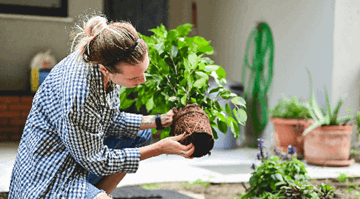It’s no secret that being outside can be good for your overall health. From taking a walk to going for a hike, there are many outdoor activities that can positively impact mental and physical well-being. But what if you prefer to use your green thumb instead of lacing up your hiking boots?
Gardening tends to become a more popular pastime during the spring and summer months, and it’s an activity people of all ages and lifestyles can enjoy. According to the National Library of Medicine (NLM), gardening can also be good for your overall health and well-being.
Whether you choose to grow vegetables, take care of flowers, or keep an herb garden, gardening typically involves moderate intensity activity. Digging, raking, and mowing are all higher intensity aspects of lawn care that can have positive effects on your physical health, but so can lower-intensity activities like watering plants and pulling weeds. Growing fruits and vegetables in your own garden and cooking with them can also help improve your diet by giving you easy access to fresh, healthy ingredients for your recipes.
Creating a garden that is peaceful and quiet can be good for your mental health. The NLM also reports that caring for a garden with others, whether in a community garden setting or in your own backyard, can help counteract feelings of loneliness and social isolation. Additionally, being outside in a garden exposes you to sunlight, which can help lower your blood pressure and provide much-needed vitamin D.
If you’re looking to get started gardening this summer, here are some tips for beginner gardeners from the Academy of Nutrition and Dietetics.
- Know what you’re growing: Making a plan for your garden can be a good way to make sure you have enough room for the kinds of plants you want to grow. Growing plants directly in the ground can be a less expensive option, but you may have more trouble controlling weeds and pests. Containers can be a good mobile option, but some plants don’t grow well with limited space. Raised beds are good for gardeners who lack healthy soil in their yard, but are a more expensive option.
- Check your soil: Having healthy soil is a key part of gardening, and you’ll want to make sure you can find loose, well-drained soil with lots of organic matter before planting. If you choose to grow plants in raised beds, then you’ll need to buy soil to fill them. You can also improve soil quality using store-bought fertilizers and compost.
- Gather your supplies: Having the right tools is essential for any activity, and gardening is no exception. Start with the basics like a shovel, rake, trowel, and watering can, and you may want a hoe or pruning shears. You’ll also need to make sure you have a nearby, reliable source of water, as well as cages, stakes, or trellises if you decide to grow climbing plants like cucumbers or tomatoes.
- Ready, set, grow: Once you’ve prepared your soil and purchased all of your supplies, it’s time to start your garden! Follow the plan you made and create a routine to take care of your plants. Be proactive in solving potential problems like pests or weeds, and pay attention to how your plants look. Don’t be afraid to ask for help or advice. The Arkansas Cooperative Extension Service offers tips and will even test your soil and plant samples to assess nutrient levels and soil health to inform decisions about fertilization and care.
Gardening offers a variety of health benefits, and it’s also a fun seasonal activity. Whether you’re contributing to a community garden or growing vegetables as a family, gardening can be good for your health. Find more tips to help start your gardening journey on the Academy of Nutrition and Dietetics’ website.






